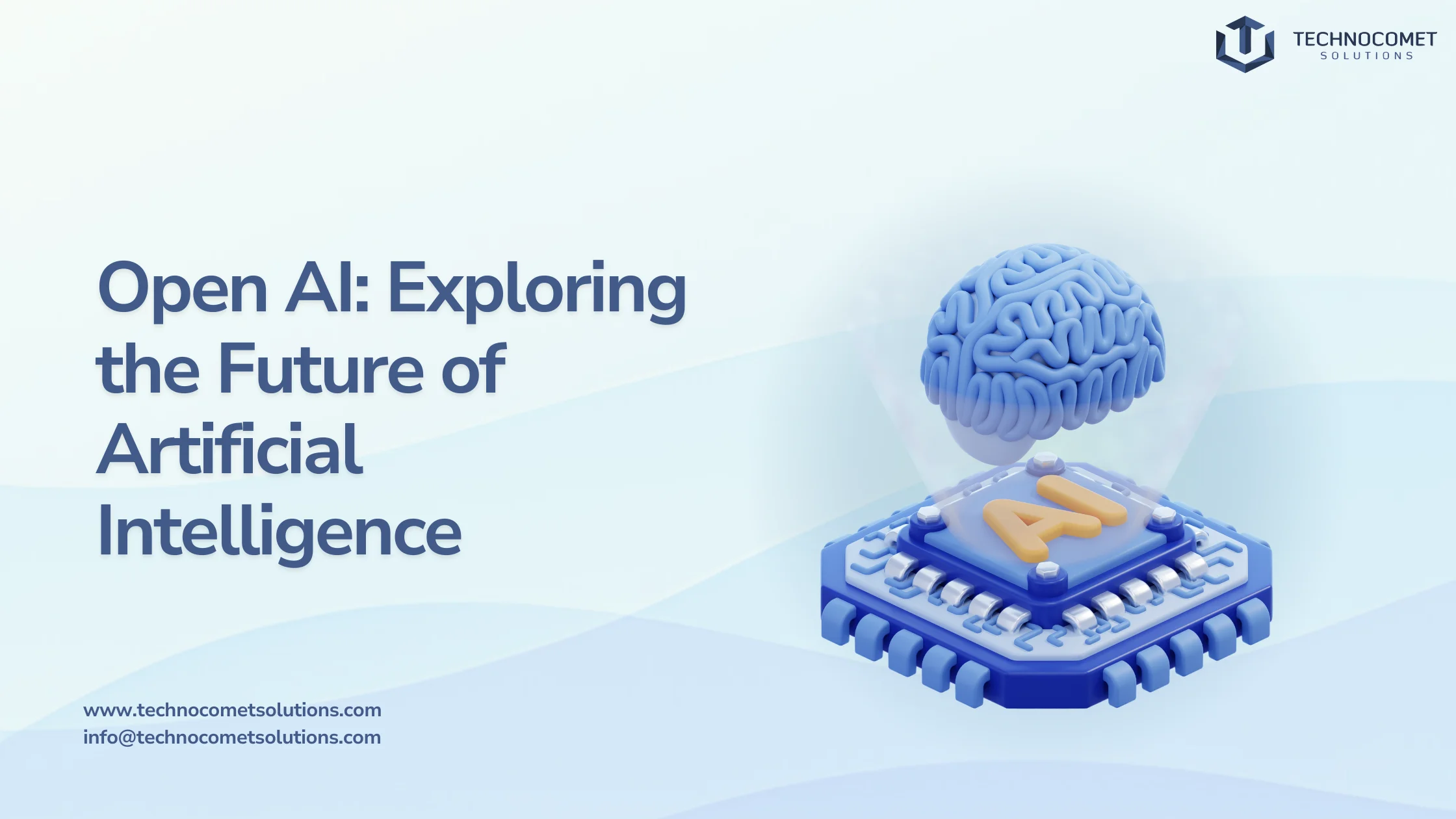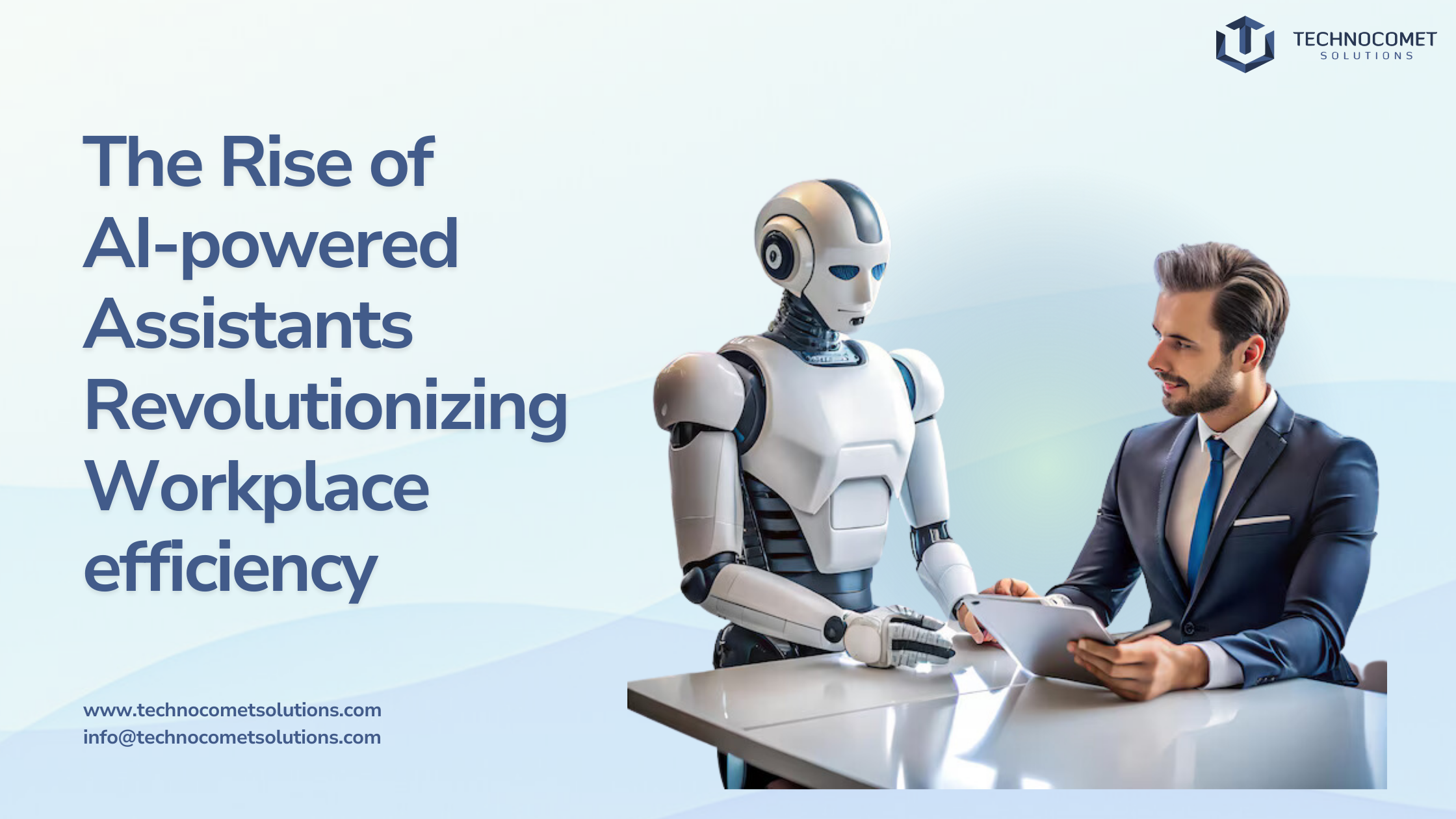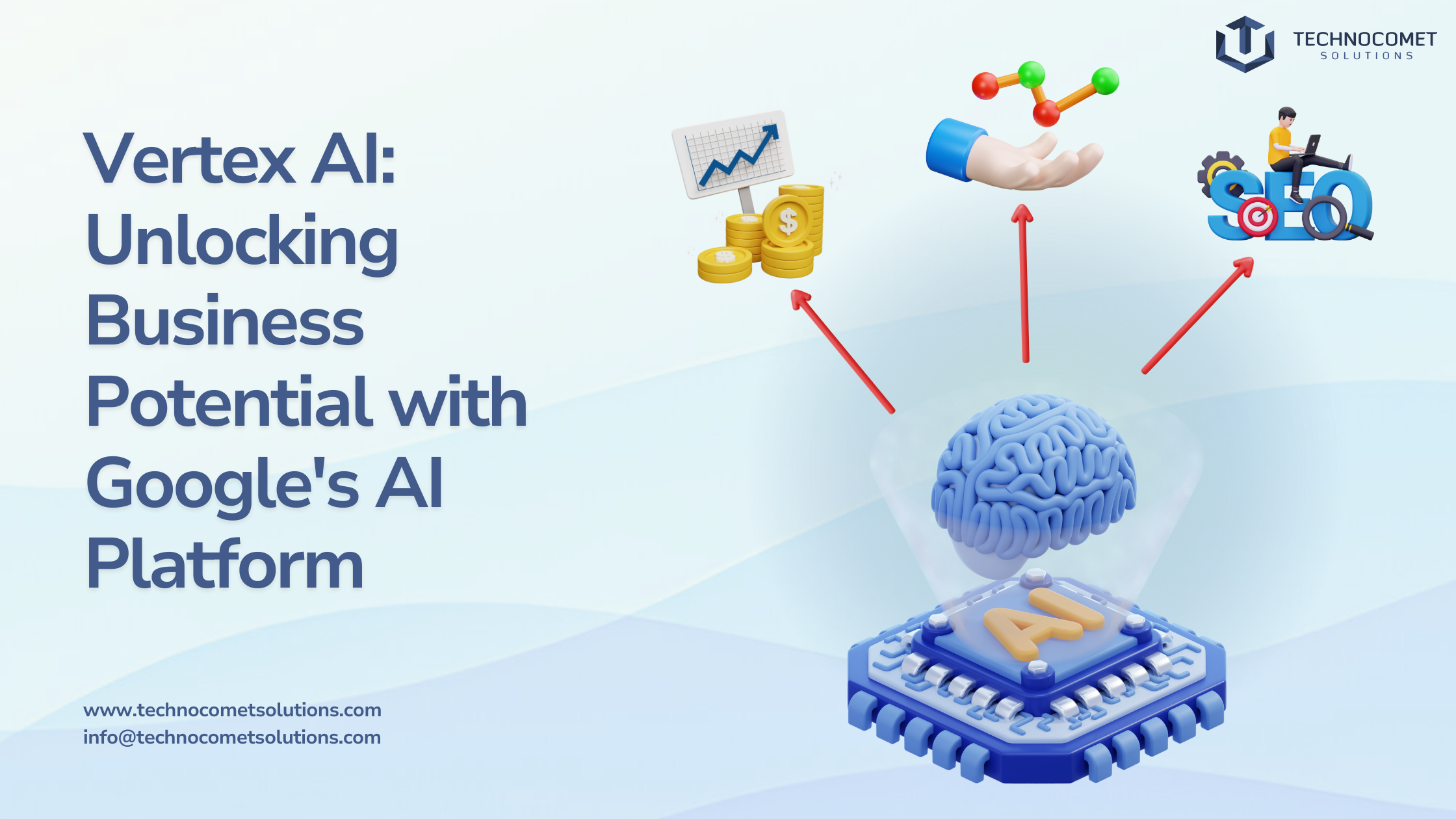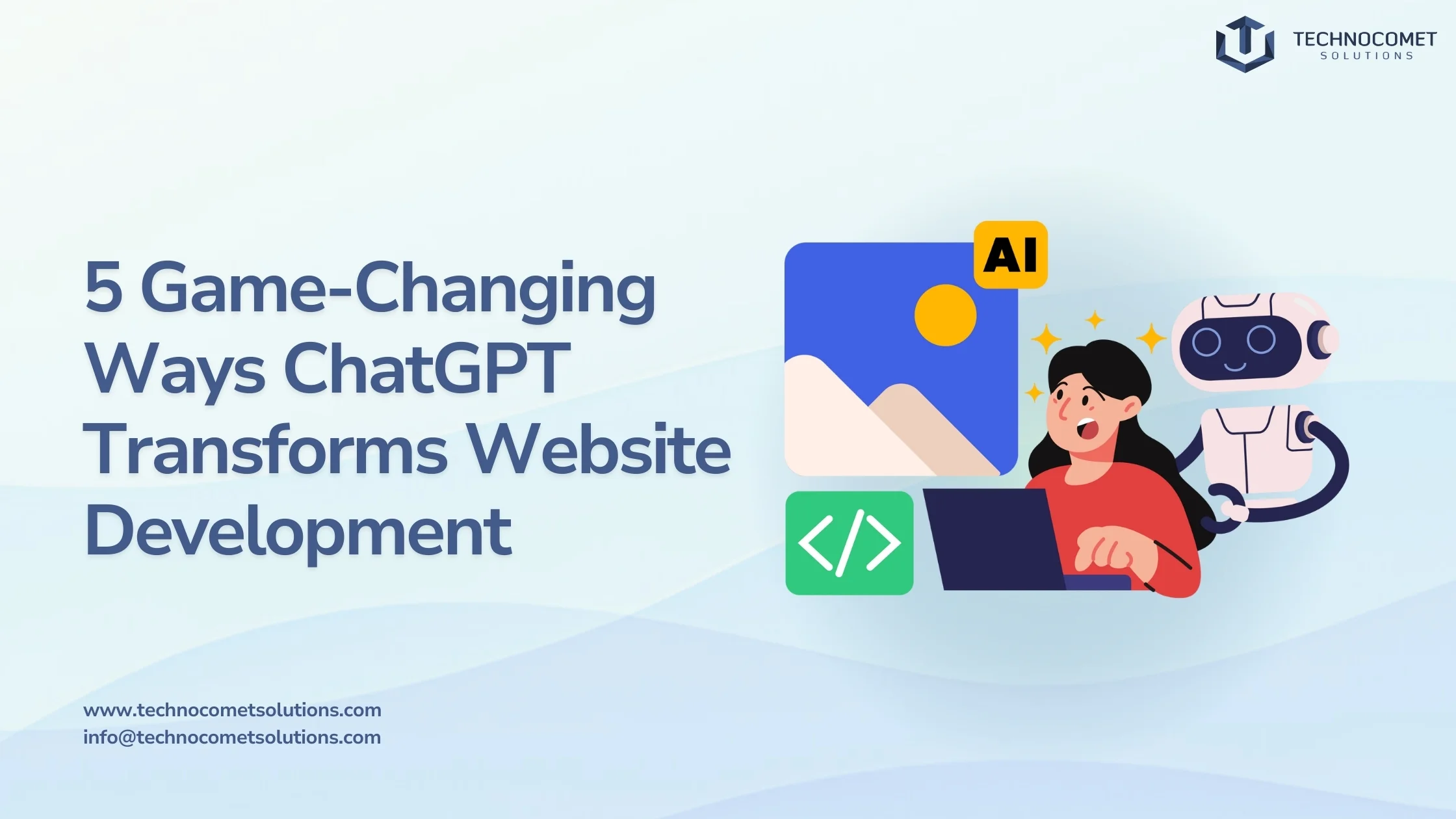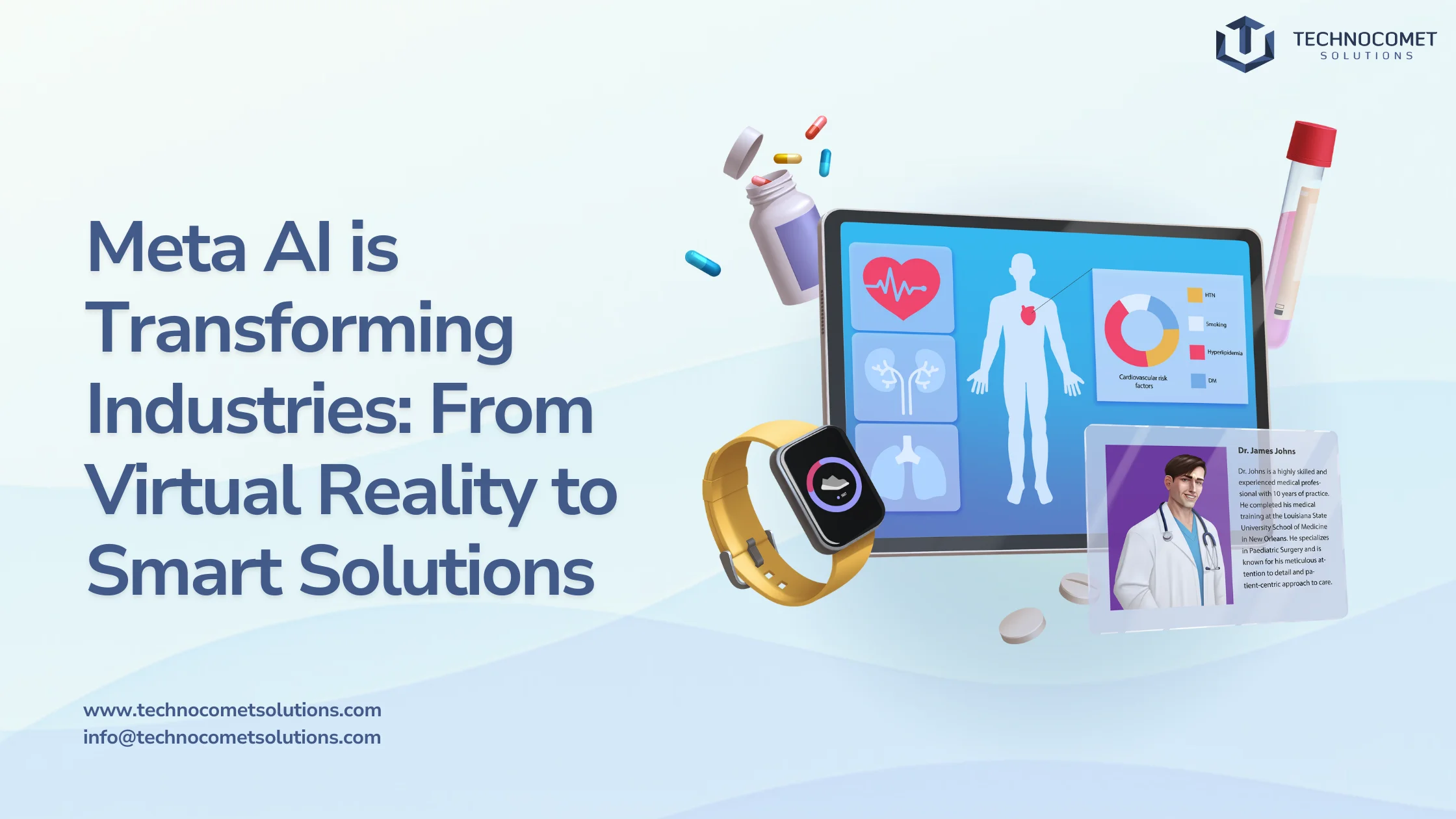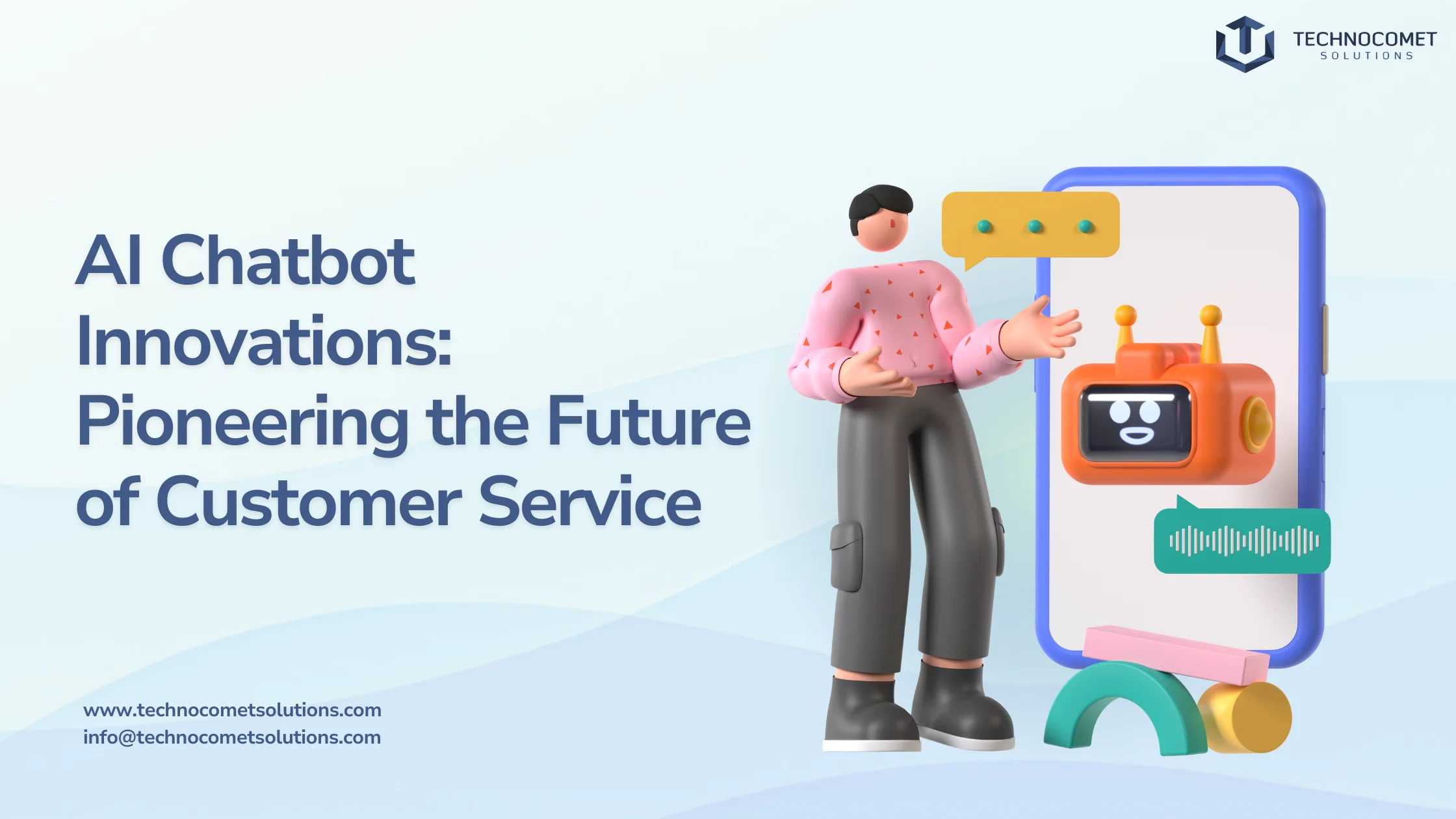Introduction
In an era where technology is rapidly evolving, Open AI stands out as a pioneering force in the field of artificial intelligence (AI). Founded with a mission to ensure that AI benefits all of humanity, Open AI is committed to developing advanced technologies that are safe, ethical, and accessible. The organization has made significant strides in various sectors, including healthcare, education, and business, by leveraging its powerful AI models to enhance human capabilities and improve quality of life. Companies like TechnoComet Solutions are partnering with such innovations to integrate cutting-edge AI solutions into their services, further driving industry advancements.
As we dive into the journey of Open AI from its humble beginnings as a research lab to its current status as an industry leader. We will explore the core technologies that drive its innovations, the real-world applications that are transforming industries, and the ethical considerations that guide its work.
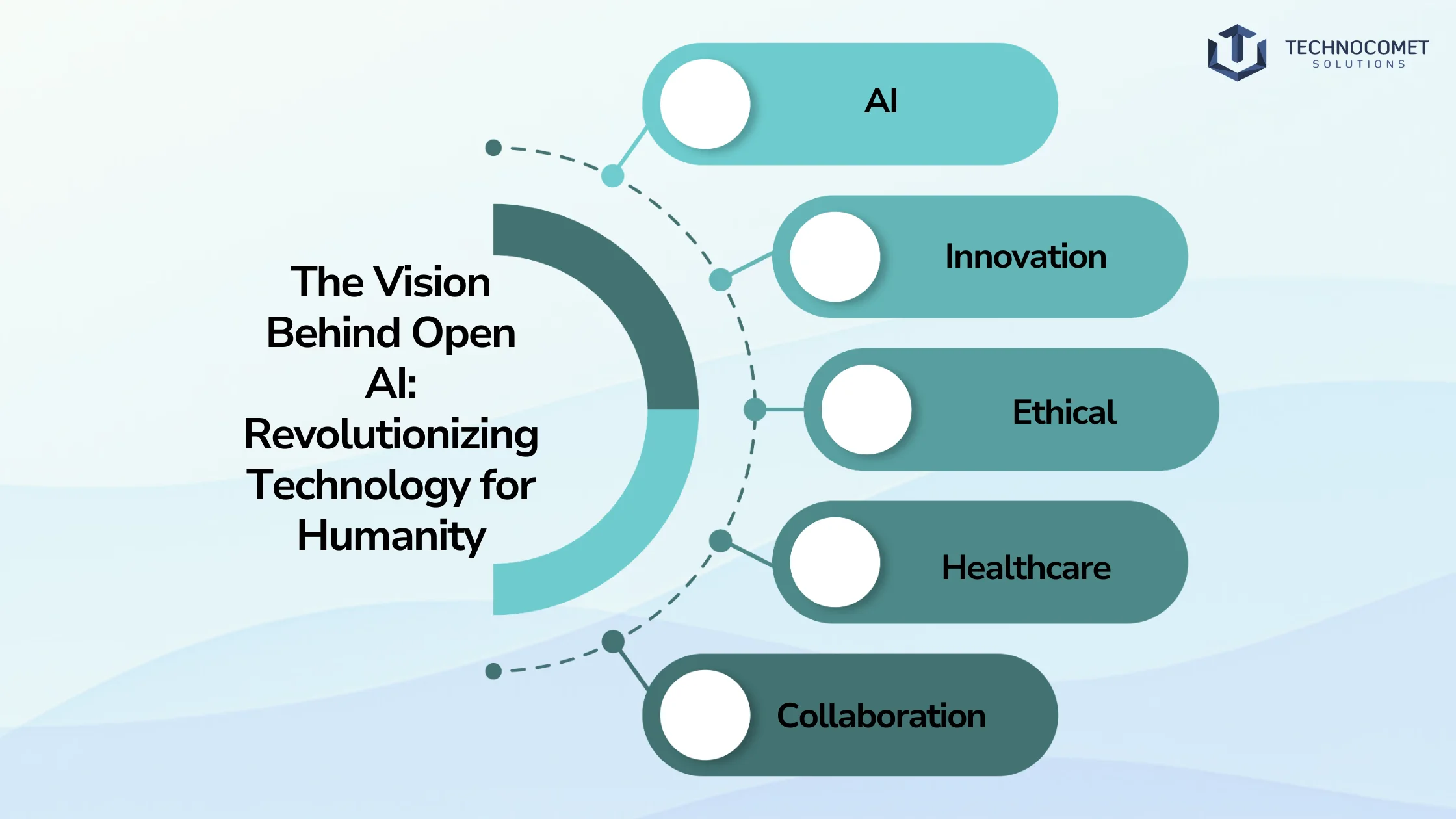
The Vision Behind Open AI: Revolutionizing Technology for Humanity
Open AI is at the forefront of artificial intelligence (AI) innovation, driven by a vision to ensure that AI benefits all of humanity. The organization aims to create advanced AI technologies that are safe, ethical, and accessible. By focusing on the development of powerful AI models, Open AI seeks to revolutionize various sectors, including healthcare, education, and business, ultimately enhancing human capabilities and improving quality of life. This vision is rooted in the belief that AI can solve some of the world’s most pressing challenges.
Open AI envisions a future where technology complements human effort rather than replacing it. As such, their mission emphasizes collaboration between humans and machines to achieve greater outcomes.
Open AI’s Journey: From Research Lab to Industry Leader
Founded in December 2015, Open AI started as a research lab with the goal of advancing digital intelligence in a way that is safe and beneficial. Over the years, it has evolved into a leader in the AI industry, known for its groundbreaking work on models like GPT-3 and DALL·E. This journey has been marked by significant milestones, including partnerships with major tech companies and the launch of various AI applications that have transformed how we interact with technology. Each step in this journey has been fueled by a commitment to innovation and a desire to push the boundaries of what is possible with AI.
The organization shifted from a non-profit model to a capped-profit structure. This transition ensured sustainable funding while maintaining ethical commitments.
Why Open AI Matters: Shaping the Future of Artificial Intelligence
Open AI plays a crucial role in shaping the future of AI by addressing key challenges such as safety, transparency, and ethical considerations. Its commitment to responsible AI development ensures that technological advancements do not come at the expense of societal values. As AI continues to permeate everyday life, Open AI’s influence is vital in guiding its evolution towards a more equitable future.
Open AI also collaborates with policymakers to advocate for safe AI regulations. By fostering open dialogue, it helps society navigate ethical dilemmas associated with AI.
Understanding Open AI’s Core Technologies
The Power of GPT Models: Redefining Natural Language Processing
At the core of Open AI’s offerings are its Generative Pre-trained Transformer (GPT) models. These models have redefined natural language processing (NLP) by enabling machines to understand and generate human-like text. The latest iteration, GPT-4, showcases remarkable capabilities in text comprehension, generation, and even creative writing. With each new version, these models become more adept at understanding context and nuance in language.
Businesses use GPT for content creation, customer support, and more. This increases efficiency across industries.
Reinforcement Learning: Teaching Machines Through Trial and Error
Open AI also employs reinforcement learning techniques to train AI systems through trial and error. This approach allows machines to learn optimal behaviors by receiving feedback based on their actions. By simulating environments where agents can explore different strategies, Open AI enhances the ability of AI systems to make decisions that maximize rewards over time. Reinforcement learning mimics how humans learn from experience, making it a powerful tool for developing intelligent agents capable of adapting to complex scenarios.
Applications include gaming strategies and refining robotics movements.
Codex and DALL·E: Pushing the Boundaries of Creativity
Open AI’s Codex model extends its capabilities beyond text generation into programming assistance. Codex can understand natural language prompts and convert them into functional code snippets, making it a valuable tool for developers. Similarly, DALL·E represents a leap in creativity by generating images from textual descriptions. These innovations empower users across various fields, enabling artists to visualize concepts quickly or helping programmers streamline their coding processes.
Both tools empower users across fields, streamlining processes and sparking innovation.
Applications of Open AI in Real-World Scenarios
Transforming Workflows: Open AI in Business and Creative Industries
Open AI’s technologies are transforming workflows across various industries. In business settings, tools powered by Open AI streamline operations by automating customer service through chatbots that can handle inquiries efficiently. In creative fields, writers utilize GPT models for brainstorming ideas or generating content quickly, enhancing productivity. These applications not only save time but also allow professionals to focus on higher-level tasks that require human insight and creativity.
Companies leveraging these tools report increased satisfaction among customers due to faster response times and personalized interactions.
AI for Good: Advancing Healthcare, Education, and Environmental Solutions
The impact of Open AI extends into sectors like healthcare and education. For instance, predictive analytics powered by AI can identify patients at risk for chronic diseases, enabling early interventions. In education, personalized learning experiences can be created using AI-driven platforms that adapt to student needs. These advancements not only improve outcomes but also democratize access to quality education and healthcare resources worldwide.
Environmental solutions benefit from AI’s ability to analyze data patterns for better resource management. helping combat climate change through informed decision-making.
Open AI in Everyday Life: How AI is Simplifying Modern Living
In daily life, Open AI’s applications simplify tasks ranging from scheduling appointments to providing instant information via virtual assistants. These tools enhance convenience and efficiency for users while demonstrating the practical benefits of integrating AI into everyday routines. For example, smart home devices powered by Open AI can learn user preferences over time adjusting settings automatically for optimal comfort or energy savings.
Additionally, educational apps using GPT technology offer personalized tutoring experiences that cater to individual learning styles.
The Ethical Framework of Open AI
Building Responsible AI: Ensuring Safety and Fairness in AI Systems
Open AI prioritizes ethical considerations in its development processes. By establishing guidelines for responsible AI use, it aims to prevent misuse while promoting safety and fairness within its systems. This commitment ensures that AI technologies enhance human capabilities without compromising ethical standards or societal values. To achieve this goal, Open AI conducts rigorous testing on its models before deployment, ensuring they meet established safety benchmarks.
Furthermore, ongoing audits help identify potential risks associated with new features or functionalities as they are introduced into products.
Addressing Bias and Inclusivity in AI Development
Addressing bias is critical in ensuring that AI systems serve diverse populations fairly. Open AI actively works on identifying biases within its models and implementing strategies to mitigate them. This focus on inclusivity helps create technologies that reflect a broader range of perspectives and experiences ultimately leading toward more equitable outcomes across different demographics.
Collaborating with ethics researchers helps Open AI continuously refine its approaches. This ensures the organization stays updated on emerging issues, particularly those related to bias in machine learning.
Open AI’s Commitment to Transparency and Collaboration
Transparency is another cornerstone of Open AI’s ethical framework. By openly sharing research findings and collaborating with other organizations, Open AI fosters an environment where knowledge can be shared freely among stakeholders involved in shaping future developments within artificial intelligence fields globally. This openness not only builds trust but also encourages innovation as diverse perspectives come together around shared goals.
Ultimately benefiting society as a whole through collaborative efforts aimed at addressing pressing challenges posed by rapid technological advancements today!
Open AI and the Competitive AI Landscape
How Open AI Stands Out Among AI Giants
In a competitive landscape filled with numerous tech giants investing heavily in AI research, Open AI distinguishes itself through its unique approach to model development and safety protocols. Its commitment to open research practices sets it apart from others who may prioritize proprietary advancements over collaborative growth, creating an ecosystem where knowledge sharing leads directly toward accelerated progress!
Transparency about the limitations of existing models builds user trust. It also encourages responsible adoption by organizations integrating these tools into their workflows.
The Role of Partnerships and Open-Source Contributions
Partnerships play a significant role in enhancing Open AI’s capabilities as it navigates this competitive landscape effectively! Collaborations with universities and tech companies allow for shared resources while leveraging expertise across disciplines, driving innovation forward at unprecedented speeds compared against traditional methods employed historically within industries reliant heavily upon siloed approaches previously adopted priorly!
Open-source contributions allow developers worldwide to access powerful tools. This enables them to leverage advancements created through collaboration to address real-world problems in diverse global contexts.
Navigating Market Demands: Staying Relevant in a Rapidly Evolving Field
As market demands shift rapidly due to technological advancements occurring frequently today, OpenAI remains agile by continuously adapting its offerings based on user feedback along with industry trends observed closely throughout operational practices implemented regularly! This responsiveness ensures staying relevant while meeting the evolving needs of businesses and consumers alike who increasingly seek out innovative solutions designed specifically and customized towards enhancing productivity and efficiency overall!
Active engagement in forum discussions on emerging issues helps inform strategic decisions for future developments. This ensures that objectives remain aligned with organizational practices moving forward.
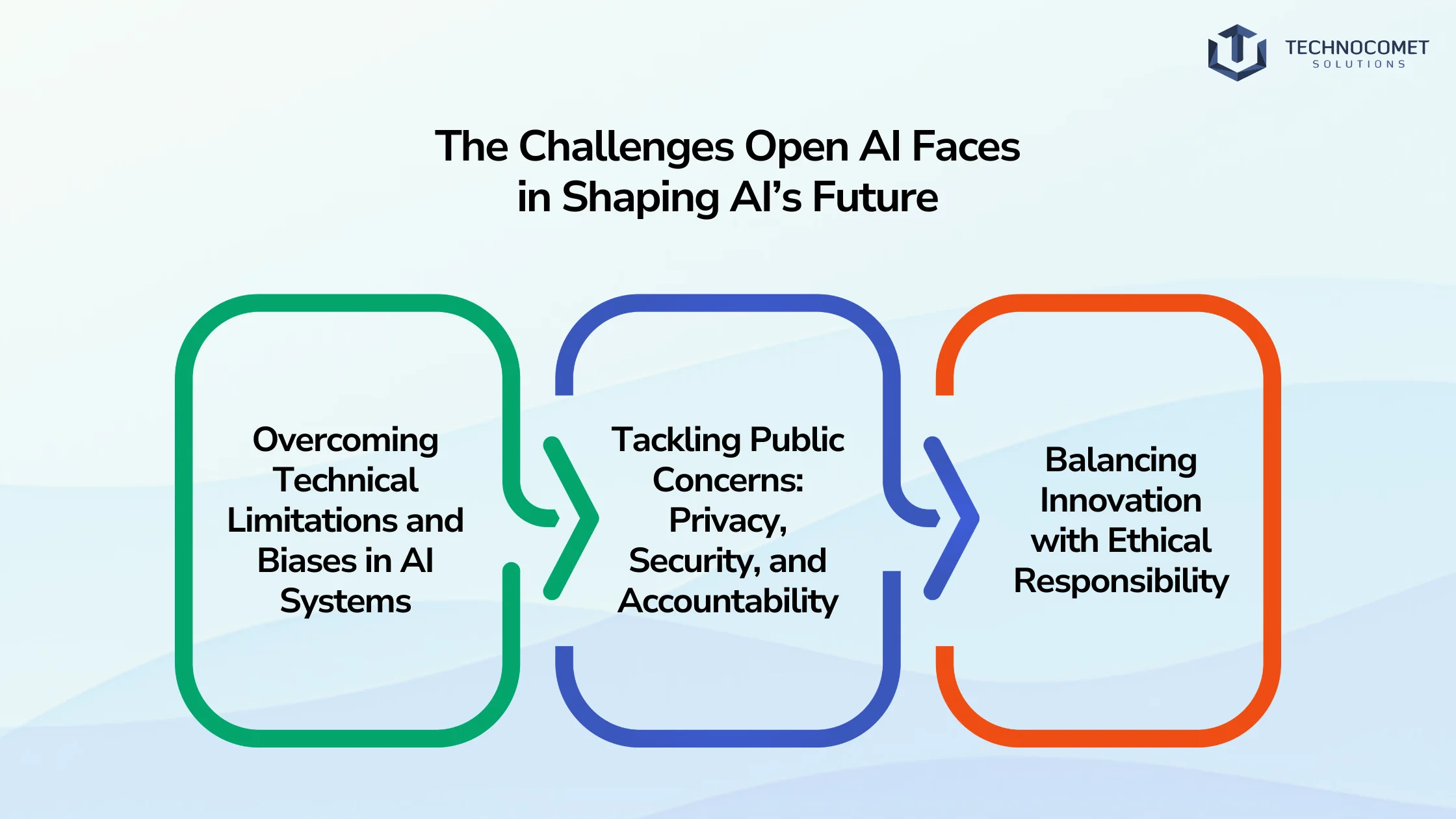
The Challenges Open AI Faces in Shaping AI’s Future
Overcoming Technical Limitations and Biases in AI Systems
Despite its successes achieving remarkable milestones thus far, OpenAI faces challenges related to technical limitations inherent in current models deployed widely today! These include issues like understanding context deeply or generating content that aligns perfectly with user intent, a critical aspect ensuring satisfaction among end users relying heavily upon outputs produced consistently across various applications utilized frequently on a daily basis!
Ongoing efforts are needed to address biases in training data, as they can lead to skewed outputs and potentially harmful consequences, perpetuating inequalities in society.
Tackling Public Concerns: Privacy, Security, and Accountability
Public concerns regarding privacy and security are paramount as artificial intelligence technologies proliferate across numerous sectors, impacting lives. Individuals everywhere increasingly rely upon them on a daily basis! Therefore, navigating challenges posed requires implementing robust security measures ensuring accountability systems outputs generated. remain transparent and understandable; users interacting with them regularly throughout usage periods experienced consistently over time!
Building public trust is essential for widespread adoption. This is necessary to achieve long-term goals related to responsible integration practices across industries using advanced algorithms.
Balancing Innovation with Ethical Responsibility
Striking a balance between innovation Ethical responsibility remains a critical challenge faced consistently throughout the journey undertaken thus far towards realizing ambitious objectives set forth initially when founded back in 2015! As pushes boundaries, technological development must consider potential societal impacts, ensuring advancements do not compromise standards established previously to uphold values cherished deeply within communities served worldwide today! Continuous reflection upon implications arising from decisions made informs strategic direction taken, guiding future endeavors pursued.
Ultimately, decisions made today shape the legacy for future generations. These choices influence the trajectory of progress, as global challenges are addressed collectively and collaboratively.
What Lies Ahead for Open AI and Artificial Intelligence
Pioneering General AI: Moving Closer to Human-Like Intelligence
Looking forward, one ambitious goal is pioneering general artificial intelligence (AGI), involving creating systems capable of performing any intellectual task a human can do, moving closer to human-like reasoning abilities while maintaining safety protocols established previously guiding development efforts undertaken thus far!
Achieving this milestone represents the culmination of years of dedicated research, unlocking the full potential of advanced algorithms to maximize benefits in the industry.
The Role of Open AI in Shaping Global AI Policies and Standards
As an influential player in the field of artificial intelligence, I am well-positioned to shape global policies surrounding the use of technologies deployed worldwide, impacting the lives of individuals everywhere who increasingly rely upon them on a daily basis! Participating in discussions about regulations governing technology deployment allows for the contribution of insights and best practices developed over years of experience navigating the complexities associated with the rapidly evolving landscape.
The field is characterized by constant change, driven by frequent technological advancements that impact individuals’ lives daily.
Open AI’s Vision for the Next Decade of AI
In the next decade, advanced artificial intelligence will seamlessly integrate into daily life. It will enhance productivity while ensuring ethical considerations remain a priority. Development efforts will focus on collaboration to achieve shared goals established since its inception in 2015. This vision includes expanding access to powerful tools for individuals from all backgrounds. The aim is to ensure everyone benefits from technological advancements. These efforts will address real-world problems encountered daily across diverse global contexts.
Conclusion
OpenAI stands as a beacon of innovation within the realm of artificial intelligence, driving transformative changes across industries while upholding ethical standards throughout its journey. As we continue exploring possibilities enabled by this remarkable technology, ranging from natural language processing breakthroughs through GPT models to creative endeavors powered by DALL-E, the potential seems limitless. By focusing on responsible development practices alongside collaboration efforts across sectors, OpenAI not only shapes current trends but also paves pathways toward future advancements aimed at benefiting humanity as a whole.
For those looking to harness the power of AI in their business, TechnoComet Solutions offers comprehensive IT services customized to your needs. Explore how we can help you integrate cutting-edge solutions into your operations today!
FAQs
Open AI is an artificial intelligence research organization that aims to develop and promote friendly AI for the benefit of humanity. Founded in 2015, it is known for creating advanced AI models, including the GPT series and DALL·E.
Open AI’s technology enhances everyday life by providing tools that simplify tasks such as language translation, content generation, and customer service automation. These applications help improve efficiency and accessibility across various sectors.
Open AI emphasizes ethical AI development by addressing issues like bias, transparency, and accountability. The organization is committed to ensuring that its technologies are safe and beneficial for all users.
Open AI is shaping the future of AI through continuous innovation, collaboration with various industries, and a focus on responsible AI practices.

